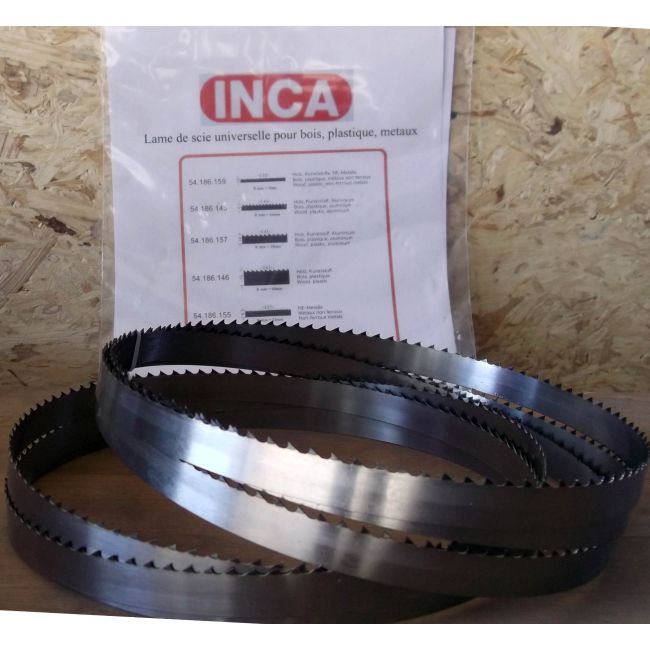87 5/8 inch bandsaw blades (2225mm) (Pack of 2)
LUREM SWING EMCO,The blades displayed on this page are 87 5/8 inch bandsaw blades (2225mm) in length. They are made available in packs of two.
Require a different, custom length? We're able to custom make a band-saw blade to your requirements at no extra cost, please click here.
Why choose Inca? Click here to know more.
Inca - our company have got a good track record with respect to putting together superior merchandize : all of these bandsaw blades happen to be no exception. They are created to keep going, we have examined a lot of band saw blades and our blades keep going 5 fold longer than our competing firms. Which is several less times where you'll have to pop by to the local sharpener and then spend to have your current saw blade sharpened.
Precisely how can Inca have accomplished such a feet! This starts by just employing good quality supplies, we only work with the best EU steel (British and Swedish) and manufacture the best blades within France by our competent workforce. All things considered, with around seventy five years within the wood-working sector, we fully understand just how very important a very good blade is. Why purchase the best bandsaw and next shop for a poor blade? We've noticed this scenario occur-- you acquire the very best bandsaw in the market and later purchase a below average blade and most of the time the saw gets the blame! You want your current equipment to operate, properly, smoothly and regularly.
Inca simply offers blades developed to slice wood, when you're browsing for steel cutting blades the fact is this is not the company for you. The blade is offered in 3 TPI, 4TPI, 6TPI and 14TPI. If the following is not the length you're shopping for then simply check out this personalized blade section, exactly where we will create a good blade to your requirements at entirely no extra price!
It is important to opt for the blade for yourself, getting an accurate width, thickness and teeth for your bandsaw will make a world of difference. Initially, take into account what you're going to use the blade for. There's certainly no 'one blade fits all' method.
Teeth per inch:
Yet again, picking out the suitable teeth per inch is important and very much linked to the work . Do you need to have the ability to cut through the wood quickly - in which case the lowest TPI (Minimum 3TPI) will give a rough finish but allow you to let enable you permit you to cut swiftly. However, if it is essential to cut the wood that has a smooth finish, a larger TPI with a slow cut can do the task!
Blade Length:
The blades here are 87 5/8 inches long or 2225mm. Double check your manual comes along with your band saw to make certain you've picked the suitable length. In the event that a 87 5/8 inch blade is overly big or small you are going to either not be able to correctly tension the blade or even the blade won't fit the band saw.
Blade Thickness:
When it comes to blade thickness, when you happen to be just re-sawing or cut-off sawing we would highly recommend that you just decide on the max thickness possible, so that you will get an excellent feed rate and a great straight cut without damaging your current blade. Thick blades will conveniently take straight cuts but have a lot more challenges if twisting or bending.
That is just where a thinner blade is handy -- You will want to work with the thinner blade when you happen to be radius cutting. It is important to find the correct equilibrium, somewhere between thick and thin, peopledo have a disposition to use the thicker blades as they are cutting a solid piece of wood, which in turn may be the inappropriate method. Failure to choose the right blade can end up in the blade heating and cooling inevitably weakening the blade and triggering failure.
Inca Band Saw blade Care
Finally, bear in mind to maintain your blade whenever using it! You're likely to get more use out of your blade by ensuring that you are de-tensioning the blade after you have worked with it. Your blade will heat up while cutting, this results in the blade expanding and contracting which could bring on metal failure significantly earlier than expected.

 French
French



